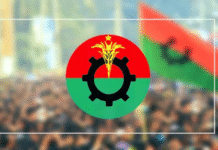Faruque Ahmed
It is quite surprising to the nation to see that police were using baton on Gonojagoran Manch spokesperson Imran H Sarkar and his followers last week at the Shahbagh city centre where he led the biggest gathering of protesters for almost two months from February last year demanding ban to religious politics and death to senior Jamaat leaders facing the war crime trial.
How could police publicly manhandle the person who was enjoying gunmen protection from the authority throughout the year with VIP status?
Police also used baton on the occasion on another group of Manch activists led by ‘children of freedom fighters.’ They had broken into violence to disrupt a gathering of Imran Sarkar at Shahbagh and the clash was virtually a follow up action of a chase and counter-chase between the two factions on the previous day.
IHS’s fall from grace
One clearly remembers that Imran H Sarkar was treated as the hero of anti-religious movement only a year ago but now he has been mysteriously reduced to zero thanks to turning nature of Bangladesh politics dominated by ruling Awami League and cunningly exploited by the left political groups who have no roots in the country’s national politics.
It is natural, one would wonder, why the Gonojagoran Manch has been divided and Imran Sarkar and his group is now facing the critical challenge from Bangladesh Chatra League (BCL), the ruling party’s students’ front which is out to banish Sarkar from the scene. BCL leaders have however turned down allegations that their men had attacked Imran Sarkar characterizing the fight basically as internal protest against misuse of power and the huge donations which Sarkar has reportedly collected from different business and agencies.
The division within the Gonojagoran Manch surfaced with various student groups demanding accountability of bank accounts that Imran Sarkar has handled in the name of the movement. Some groups blamed him for removing large amount of money while declaring him an ‘unwanted person’ within the Gonojagoron Manch. They have also demanded the Anti-Corruption Commission (ACC) to probe into the accounts.
It is alleged that Sarkar and his inner circle have collected unspecified but sizeable amount of fund from businesses and individuals. People had made contributions voluntarily at the beginning to accelerate the anti-Jamaat movement to ensure execution of party leaders facing the ICT trial. But later Imran and his group forced other people and business to pay threatening that they will be branded as anti-liberation force if they don’t pay.
Imran Sarkar’s critics said he has misappropriated fund and now trying to float a party of his own exploiting the Gonojagoran platform and its money essentially focusing on issues like accelerating the trial of Jamaat leaders and making sure that they would be sent to the gallows. In doing so he is however consciously targeting to bring pressure on the government, his critics say.
Shift in strategy
The government strategy may have shifted meanwhile and perhaps heeding to criticism that the Gonojagoran Manch has outlived its purpose. Insiders say the ruling party perhaps wants to delay war crime trial at this moment. The leftist backed Imran group on the other hand wants that the ICT trial must be accelerated and death sentence to Jamaat leaders and others must be implemented soon.
The political tension between the groups pushed by conflicting objectives came to its height again during the T20 cricket when the Prime Minister received donation from Islami Bank and the money was also partly committed to help the recording of national anthem on March 26 in an open air function.
Imran group, joining other hard core leftists objected to Islami Bank’s donation and attempted suggest it as a sell out to anti-liberation forces. Some cultural groups of extreme left mindset also put the threat that they will boycott the recording if the money was not returned. Since the cheque was received by the Prime Minister, the criticism was almost openly directed at her raising tensions further.
Reports said Imran Sarkar’s group began preparation to observe the Pohela Baisak from a separate platform in front of the Institute of Fine Arts on Dhaka University campus. BCL men dismantled the stage saying they had no permission from the varsity authorities.
In fact, the divergence of political targets and socio-cultural objectives became visible between Imran-led Gonojagoron Manch and that of the BCL soon after launching the Manch in February last year. BCL moved quickly to take control of the movement as directed by the top ruling party leadership.
Why the policy change?
Sources say the Awami League had never wanted to make madrasha teachers and students its political enemy, except fighting the Jamaat-e-Islaam isolating it from the broad based rural religious community. But the left cultural groups and some atheists grabbed the Manch to hit hard the Muslim religious sentiment by circulating texts insulting the prophet of Islam and religious values to ensue a bigger fight spreading over the street.
Consequently, the ruling party Awami League turned out to be identified as the biggest enemy of Islam by rural based clerics and it partially explains how Imran and his mentors lost political support of Awami League in the process.
So when the BCL is opposing Imran, it must be realized that it is the political decision of the ruling party at the top. Moreover, as we see, the atheist led left won the fight from Gonojagoron Manch to force the government to amend the ICT law to put Abdul Qadir Mollah to the gallows.
But on the other hand it prompted the debut of Hifajat-e-Islam, comprising of the rural clerics to emerge at the center of the country’s mainstream politics and this in turn give Jamaat-e-Islami the opportunity to freely move and survive. The latest Upazila Elections result showed Jamaat has lost a leader to the gallows but won the vast support of the nation to chart out a clear future.
Besides, the left parties proved despite their presence in parliament they have no support base to run for the Upazila elections and even the Jayiya Party is melting down while Jamaat has registered a distinct rise at the cost of both.
In Bangladesh the leftists always live in the shelter of Awami League. But the enemy within the pro-religious people that they have created for Awami Lrague may haunt the party over the years to come. Imran Sarkar may not be traceable soon but Hifajat may continue to hunt the atheists from the scene.
Source: Weekly Holiday









